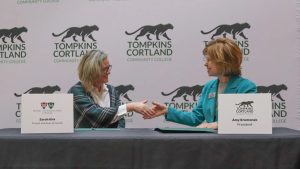OCC will receive $1.2 million; CCC will receive $629,000 SYRACUSE — A federal grant will pump more than $14.6 million into New York’s community colleges for new training in advanced manufacturing. The colleges’ Training and Education in Advanced Manufacturing Educational Pathways Project was one of the initiatives chosen to share $500 million in grants to expand […]
Get Instant Access to This Article
Become a Central New York Business Journal subscriber and get immediate access to all of our subscriber-only content and much more.
- Critical Central New York business news and analysis updated daily.
- Immediate access to all subscriber-only content on our website.
- Get a year's worth of the Print Edition of The Central New York Business Journal.
- Special Feature Publications such as the Book of Lists and Revitalize Greater Binghamton, Mohawk Valley, and Syracuse Magazines
Click here to purchase a paywall bypass link for this article.
OCC will receive $1.2 million; CCC will receive $629,000
SYRACUSE — A federal grant will pump more than $14.6 million into New York’s community colleges for new training in advanced manufacturing.
The colleges’ Training and Education in Advanced Manufacturing Educational Pathways Project was one of the initiatives chosen to share $500 million in grants to expand job training around the country. The grants are part of the Trade Adjustment Assistance Community College and Career Training initiative, which promotes skills development and employment in fields like advanced manufacturing, transportation, health care, and more, according to the U.S. Department of Labor, which is running the program with the Department of Education.
Locally, Onondaga Community College (OCC), Cayuga Community College (CCC), Broome Community College, and Mohawk Valley Community College are all involved in the project. The Manufacturers Association of Central New York is also heavily involved, according to OCC.
Among other things, the effort will help community colleges communicate more effectively with employers and learn what skills and attributes companies want in their work force, says Margaret O’Connell, interim OCC president. Despite job losses over the years, New York still has a significant manufacturing industry.
“We need to say that and take the lead in trying to have better intertwining and interfacing between community colleges and employers,” she says.
There’s often a disconnect between what skills are available in the work force and what manufacturers need, O’Connell notes. OCC’s $1.2 million portion of the federal grant will go toward developing a core curriculum for training in advanced manufacturing.
The result could be used not only at OCC, but also at colleges throughout the state, O’Connell says. The partnership with MACNY will be critical in helping the college learn exactly what employers are seeking in workers, she adds.
The curriculum needs to be relevant today, but also several years from now, O’Connell says. The work could lead to new certificate programs or courses at OCC, she adds.
CCC will use $629,000 to develop a training program focused on the plastics industry, the school said. The program could prepare students for work at growing companies in the area like Currier Plastics, Tessy Plastics, and Bo-Mer Plastics, according to the college.
The funding will allow the school to add a new advanced manufacturing lab focused on plastics technologies and pay for the development of new noncredit and credit programs in plastics. CCC will also use the money to develop a new one-year technical certificate program in precision machining.
“Receiving this grant validates the college’s planning and hard work in connecting with our industry partners in the community,” CCC President Daniel Larson said in a news release. “We have met with government and business leaders throughout the region to help us develop the academic and work-force development programming that would make the biggest impact on our regional economy.”
In addition to developing new programs, the college will create new prior-learning assessments that allow students to earn academic credits for college-level learning through life or work experience.
The federal funding went to a total of 297 schools. The grants were the second round of funding in a $2 billion, four-year initiative, according to the Labor Department.
Contact Tampone at ktampone@cnybj.com



